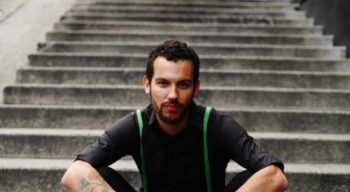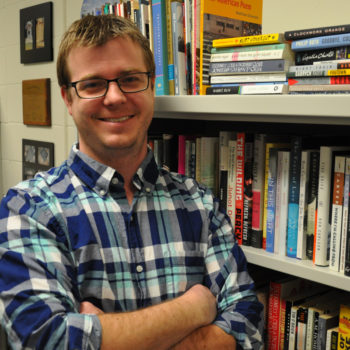
The 16th Celebration of Literary Arts Festival is preparing to take place across all DMACC campuses with events beginning on Monday, April 2 through Wednesday April 4. National and local writers of various genres will be sharing their work and meeting with students. It will be a unique opportunity for students to get insight from up-and-coming writers, and support diversity within the art community. Continue reading to hear from some of this year’s writers who took time to answer questions about the festival and share their experience of the professional writing world.
Celebration of Literary Arts Festival Schedule for Ankeny Campus:
Tuesday, April 3rd
Readings from Pam Houston and Justin Torres
Building 2, Room 25B 11:15-12:40
Several of the authors will also visit Beaverdale Books for readings and signings, Monday, April 2nd at 7 p.m. Those authors are; Justin Torres, Jennifer Chang, Matthew Olzmann and Pam Houston.
Poet, Matthew Olzmann:
Share some of your background. What genre do you write and how long have you been writing? How did you get interested in writing?
I’ve always been interested in stories; some of my earliest memories are of my mom reading to me. However, it took me a little while longer to be drawn to poems. I was well into my teens when that happened. I started seeing poems as a way to explain or understand complicated things that were happening in the world around. For example, an elegy doesn’t just announce “I’m sad;” for me, it actually offers a way to understand grief. This is how I became interested in poetry: as a reader of poems. And the more I read, the more astonishing the world became.
Is this your first time at DMACC’s Celebration of Literary Arts Festival? What are you looking forward to?
This is my first time here! And I’m grateful for the opportunity to be here. Mostly, I’m just excited to meet everyone and talk to people. I like being around people who want to talk about writing.
Describe a highlight thus far in your career. How did it feel and what did it mean to you?
Many of the things I think of as “highlights” involve some type of connection between the writing and a reader. A person you’ve never met tells you that a poem you wrote moved them. Someone emails you to say your poem was read at their wedding. I’m always reading poems by other people that make me feel more connected to the world, and the thought that I might write something that does that for someone else is deeply humbling.
What are your thoughts on the idea that students should shy away from a career in the literary arts because of its perceived instability? What reason would you give students to pursue writing rather than not?
I’d think about it as having a literary “life” rather than a literary “career.” If you really love books, or poems or stories, then it’s worth devoting your life to it. The “career” has to come from or extend out of that life, and you’ll have to love the art on its own regardless of the career because even if you’re able to get a job related to writing, or—even better—if your writing is successful enough to become your “job,” it’s still a long road with a lot of doubt along the way. So there will be times when your love of the art needs to be its own reward. That said, if it’s what you want to do, then do it. Someone is going to write the next great poem. Someone is going to write the novel you’ve been dreaming of writing. The literary world may be competitive, but all the things you want from it are out there. Those things might be difficult to get, but someone is going to get them. Why shouldn’t that be you?
What is your favorite, or least favorite word, quote, or phrase and why?
I don’t really have a “least” favorite word. Every time I think there’s a word I don’t like, it ends up making an appearance in a better writer’s poem, and it is stunning. And then it’s my favorite word—at least for a moment. A writer having a least favorite word might be like a carpenter having a least favorite tool: each of them has a right time and place; each has a purpose and is just waiting for that moment.
Fiction Author, Justin Torres:
Is this your first time at DMACC’s Celebration of Literary Arts Festival? What are you looking forward to?
This is my first time visiting DMACC and I’m looking forward to interacting with the students and with folks interested in literature.
What are your thoughts on the idea that students should shy away from a career in the literary arts because of its perceived instability? What reason would you give students to pursue writing rather than not?
I tend not to think of writing as a career so much as an artistic practice. I’m a fiction writer, and when I make money from writing a novel or short stories, it feels wonderful, but that’s not why I do it, and it’s not really my career, I pay my rent by teaching. When it comes to making art, instability is not a negative. Change is the only constant in this world, and our art and lives should welcome change. Stability is a fantasy – a pretty boring one – and yes, it is a fantasy best pursued in another profession. But likely you mean a very specific kind of stability, economic stability, which everyone deserves and so few people enjoy, and one remedy is to make very safe career choices, but whether one chooses to do that or not, we should all be fighting to decrease the gap between rich and poor, to increase social welfare programs and to increase support for the arts.
Lit Fest Coordinator, Marc Dickinson: 
A little background about you, what do you do at DMACC? How long have you been here? Any advice or quotes that have inspired you or that you often share with students?
I teach English classes, mostly creative writing and literature, and I’ve been working at DMACC for 10 years. As for advice, I love a quote from Ron Carlson—a wonderful fiction writer who came a few years ago to our literary festival—who tells his own students, “It’s not where you go to college; it’s how you go to college.” And he says the same thing about writing—it’s not what you write about; it’s how you write about it. I really like this idea that you could get into Harvard, but unless you’re engaged in the experience, it’s not meaningful. Or you could be writing something seemingly trivial, but if you engage the subject honestly, you can reveal its true importance.
What happens during the Literary Arts Festival? How long has this event been taking place at DMACC campuses? Why do you think students should come to the event? When selecting attending authors, is there anything that makes them stand out?
The literary festival invites writers from around the country and throughout the state. During the three days of the event, these poets and writers (both fiction and nonfiction) visit all six campuses, give readings of their work, and afterwards have a conversation with the audience about the art of writing. This is our 16th year, and we always try to select writers who have never attended before, have strong credentials, but are also teachers at heart—who enjoy talking to students and are open to these conversations. We stress diversity in terms of race, ethnicity, sexuality, age, gender, genre, and we like to have a different points of view: different artist voices and visions. This is maybe the main reason it’s beneficial for students to attend: to be exposed to the arts and contemporary writers.
How do you think exposure to professional literature benefits and encourages students in their endeavors in writing and/or English?
Many students may think writing is about writing argument essays or that literature is studying the past—which it is, of course. But also, writing and literature is thriving in the world around us. And many will hopefully see that poetry can be funny, fiction can focus on the real world around us, that nonfiction is about exploring life outside ourselves. I find that most students maybe haven’t encountered this kind of writing or haven’t interacted with these other world views, but going to these events is a way to experience new cultures and art forms.
As a teacher, reading the work of potential future authors everyday, what would you say are the most valuable skills students can develop if they want to advance their career in English and maybe even aspire to be a professional writer?
I love a quote from Steven Schwartz that says there are two ways to approach the professional writing life: “There is the business of writing, and then there is the writing business—and it’s helpful not to confuse the two.”
The business of writing is about persevering through the work, putting your vision on the page, revising based on trusted peers critiques—and ultimately removing your own ego in order to respect the art. These skills are invaluable—the idea of process and patience and honing your craft over time.
The writing business is about getting your work out there. But publishing is also about patience and perseverance—but of a different sort. The ability to continue to write and create in the face of rejection. But it’s essential to not put the horse before the cart. Sometimes folks are more interested in agents and book deals and best sellers lists before they’ve even written their first word. I suggest working on your skills and making that its own reward first (the business of writing) before worrying about the more tangible rewards (the writing business). And of course this is what college and writing classes are for—they give you a chance to work on the intangible, the process, so hopefully by the time you graduate you have the skills to then work toward the professional rewards.





Comments